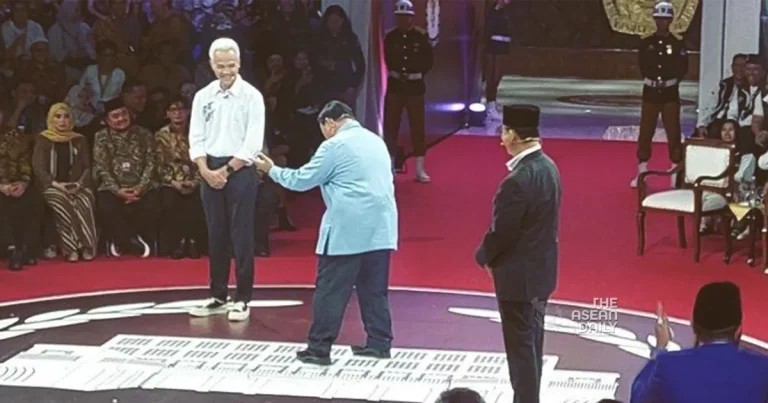13-12-2023 (JAKARTA) In a high-stakes televised election debate, Indonesia’s presidential front runner, Prabowo Subianto, tackled a barrage of challenging questions on December 12. The debate, which marked the beginning of a series of televised discussions, delved into contentious issues, ranging from the controversial Constitutional Court ruling on the minimum age for presidential candidates to concerns about the country’s democracy.
Prabowo, the current Defence Minister, faced off against former Jakarta governor Anies Baswedan and former Central Java governor Ganjar Pranowo. The trio expressed their views on various topics, including the separatist conflict in Papua, the rights of religious minorities, and the quality of public service.
As the debate unfolded, tensions rose, and the contenders wasted no time in engaging in verbal sparring. The discussion became intense, with red faces and quivering voices, as supporters in the audience cheered on their respective candidates.
Anies directed a question at Prabowo regarding the “serious ethical violation” related to the Constitutional Court ruling that lowered the minimum age for presidential candidates. This ruling allowed President Joko Widodo’s 36-year-old son, Gibran Rakabuming Raka, to enter the race as Prabowo’s running mate.
Prabowo defended the court’s decision, stating that it was final and unchangeable. He urged voters to make their judgment at the ballot box on February 14, 2024. The debate took a fiery turn when Prabowo, with raised vocal intensity, asserted, “Sorry to say, Mr Anies, I have nothing, and I am ready to die for this country.”
The debate, which focused on law, human rights, governance, corruption, democracy, and tolerance, set the tone for a series of discussions that will run until February 4. The candidates, along with expert panellists, explored various topics such as defence, international relations, digital economy, and environmental issues.
Anies, positioning himself as a voice of change, criticised the erosion of democracy and freedom of speech in Indonesia. He questioned the contradiction where a millennial like Gibran can become a vice-presidential candidate, yet other millennials, when expressing opinions or criticizing the government, face clashes and tear gas.
Prabowo countered Anies’s critique, stating that he was being excessive with his complaints about democracy. He reminded Anies of his successful election as Jakarta governor, emphasizing that if democracy did not work, Anies, as an opposition figure, would not have been elected.
As the presidential campaign intensifies, recent opinion polls indicate Prabowo’s comfortable lead over his opponents. However, with the political landscape evolving, the debates play a crucial role in shaping public opinion and influencing the outcome of the upcoming election.




